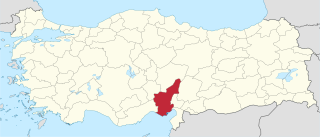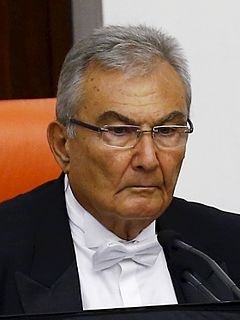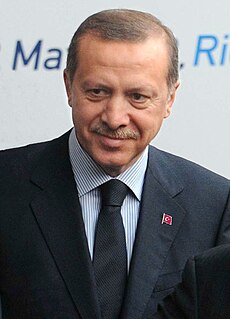
Adana Province, is a province of Turkey located in south-central Anatolia. With a population of 2.20 million, it is the sixth most populous province in Turkey. The administrative seat of the province is the city of Adana, home to 79% of the residents of the province. The province, geographically and as well as economically, is part of the Çukurova region together with Mersin, Osmaniye and Hatay provinces.

The Justice and Development Party, abbreviated officially AK Parti in Turkish, is an Islamist political party in Turkey. Developed from the conservative tradition of Turkey's Ottoman past and its Islamic identity, the party is the largest in Turkey. Founded in 2001 by members of a number of existing conservative parties, the party has won pluralities in the six most recent legislative elections, those of 2002, 2007, 2011, June 2015, November 2015, and 2018. The party held a majority of seats for 13 years, but lost it in June 2015, only to regain it in the snap election of November 2015 but then lose it again in 2018. Its electoral success has been mirrored in the three local elections held since the party's establishment, coming first in 2004, 2009 and 2014 respectively. The current party leader is Recep Tayyip Erdoğan, the incumbent President of Turkey.

The Republican People's Party is a Kemalist and social-democratic political party in Turkey. It is the oldest political party in the country, and is currently the main opposition in the Grand National Assembly. The CHP describes itself as "a modern social democratic party, which is faithful to the founding principles and values of the Republic of Turkey". The party is cited as "the founding party of modern Turkey". Its logo consists of the Six Arrows, which represent the foundational principles of Kemalism: republicanism, nationalism, statism, populism, laicism, and reformism.

The Grand National Assembly of Turkey, usually referred to simply as the TBMM or Parliament, is the unicameral Turkish legislature. It is the sole body given the legislative prerogatives by the Turkish Constitution. It was founded in Ankara on 23 April 1920 in the midst of the National Campaign. The parliament was fundamental in the efforts of Mareşal Mustafa Kemal Atatürk, 1st President of the Republic of Turkey, and his colleagues to found a new state out of the remnants of the Ottoman Empire.

The Freedom and Solidarity Party is a left-libertarian and internationalist socialist political party in Turkey.

Deniz Baykal is a Turkish politician at the Republican People's Party (CHP) who served as Deputy Prime Minister and Minister of Foreign Affairs from 1995 to 1996. Having served in numerous government positions, Baykal led the CHP from 1992 to February 1995, from September 1995 to 1999 and again from 2000 to 2010. Between 2002 and 2010, he also served as the Leader of the Opposition by virtue of leading the second largest party in Parliament.

The Second Constitutional Era of the Ottoman Empire established shortly after the 1908 Young Turk Revolution which forced Sultan Abdul Hamid II to restore the constitutional monarchy by the revival of the Ottoman Parliament, the General Assembly of the Ottoman Empire and the restoration of the constitution of 1876. The parliament and the constitution of the First Constitutional Era (1876–1878) had been suspended by Abdul Hamid in 1878 after only two years of functioning. Whereas the First Constitutional Era had not allowed for political parties, the Young Turks amended the constitution to strengthen the popularly elected Chamber of Deputies at the expense of the unelected Senate and the Sultan's personal powers, and formed and joined many political parties and groups for the first time in the Empire's history.

The 15th Turkish general election was held on 3 November 2002 following the collapse of the DSP-MHP-ANAP coalition led by Bülent Ecevit (1925-2006). It was the 15th general election to be held in Turkey. All 550 members of the Grand National Assembly were up for election.

Turkey's 17th general election was held on 12 June 2011 to elect 550 new members of Grand National Assembly. In accordance to the result of the constitutional referendum held in 2007, the election was held four years after the previous one instead of five.
Turkey held local elections on 25 March 1984. In the elections, both the mayors and the local parliaments were elected. The figures presented below are the results of the local parliament elections.
Turkey held local elections on 2 June 1968. In the elections, both the mayors and the local parliaments were elected. The figures presented below are the results of the local parliament elections.
Turkey held local elections on 17 November 1963. In the elections, both the mayors and the local parliaments were elected. The figures presented below are the results of the local parliament elections.
Turkey held local elections on 26 March 1989. In the elections, both the mayors and the local parliaments were elected. The figures presented below are the results of the local parliament elections.
Turkey held local elections on 9 December 1973. In the elections, both the mayors and the local parliaments were elected. The figures presented below are the results of the local parliament elections.

Senate of the Republic was the upper house of Turkish Parliament between 1961 and 1980. It was established with the Turkish constitution of 1961 and abolished with the 1982 constitution, although it did not exist after 12 September 1980 as a result of the 1980 coup d'état.

The 2003 by-election in the Province of Siirt was held on 9 March 2003 in order to elect three Members of Parliament from the eastern Turkish province of Siirt to the Grand National Assembly of Turkey. The by-election was held four months after the 2002 general election in November, which the Supreme Electoral Council of Turkey declared null and void in Siirt due to voting irregularities in the district of Pervari. The council decided on 2 December 2002 that the complaints by the local electoral authorities had influenced on the election result, thus calling a by-election.
The Electoral cycle of Turkey is composed of three different types of elections, namely general elections every five years, local elections every five years and presidential elections every five years. Occasionally, referendums may be held if at least 360 Members of Parliament in the Grand National Assembly vote in favour of a constitutional amendment. Elections are overseen by the Supreme Electoral Council of Turkey.

The Electoral system of Turkey varies for general, presidential and local elections that take place in Turkey every four years, five years and five years respectively. Turkey has been a multi-party democracy since 1950, with the first democratic election held on 14 May 1950 leading to the end of the single-party rule established in 1923. The current electoral system for electing Members of Parliament to the Grand National Assembly has a 10% election threshold, the highest of any country.

İsmet Sezgin was a Turkish politician who served as the Deputy Prime Minister of Turkey and Minister of National Defence from 1997 to 1999, as the Speaker of the Grand National Assembly in 1995, as the Minister of the Interior from 1991 to 1993, as the Minister of Finance from 1979 to 1980 and as the Minister of Youth and Sports from 1969 to 1971. Between 1999 and 2002, he served as the Leader of the Democrat Turkey Party, but did not contest any elections.













